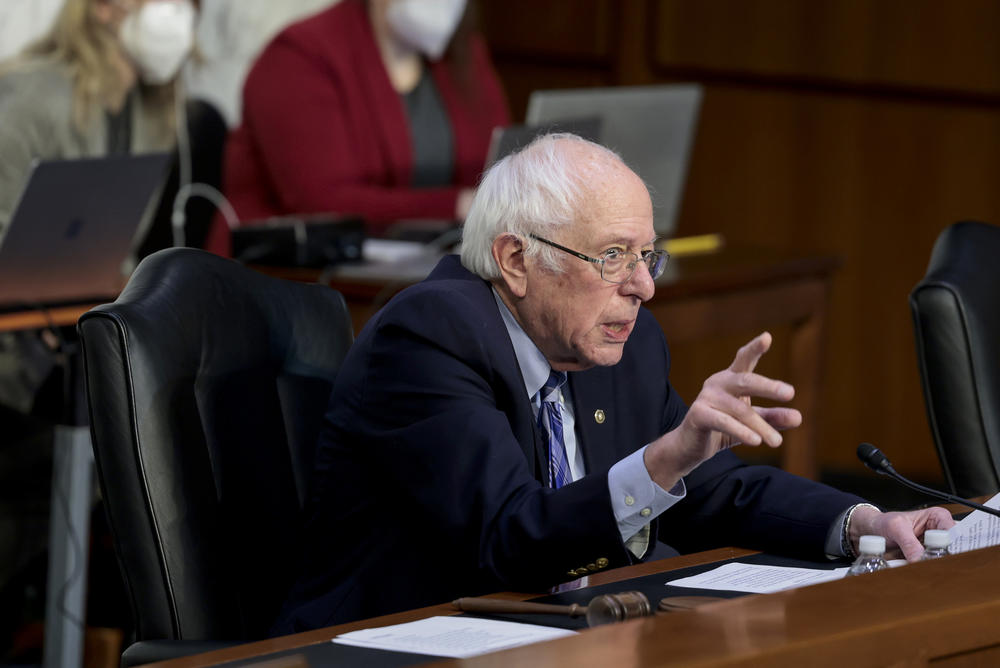Section Branding
Header Content
Struggling Democrats hope growing union support will provide boost in midterms
Primary Content
Updated April 6, 2022 at 8:56 AM ET
On paper, Rily Hughlett's not someone Democrats have a chance of winning. He's an Alabama coal miner, votes to protect the Second Amendment, opposes abortion and watches Fox News.
But he's also a coal miner – one who's been on strike against Warrior Met Coal in Brookwood, Alabama, alongside hundreds of others for the past year. He's manned picket lines, collected strike insurance checks and attended weekly rallies for the union. And in January, lunch at one of those rallies was covered by Bernie Sanders.
Hughlett ate anyway.
"The man stepped up," Hughlett said. "I'm shocked but at least it points to he's a decent person."
Democrats are losing support on everything from inflation to crime, signaling a potential loss of both the House and the Senate.
But labor unions offer Democrats a chance to change that and appeal to workers normally outside their reach. While union membership sits tied at a record low, union approval has reached its highest point since 1965. According to Gallup, 68% of Americans approve of unions. And nearly half of Republicans say they do.
Big companies like Kellogg's were hit by strikes last year and organizing campaigns picked up at companies like Amazon and Starbucks. In a stunning upset last week, workers at an Amazon warehouse on Staten Island in New York voted to form the company's first union in the U.S.
Leaning into the labor movement gives Democrats a chance not just to win over union members, but other voters they're losing.
It's also an opportunity for image reform. Democrats used to be known as the party of the working class. But Donald Trump captured a lot of those voters. The former president's blue collar appeal helped him flip states like Michigan and Wisconsin in 2016. And many union members continued to support Trump in 2020.
"He keep you working," said Mathew Wright, one of the striking Alabama coal miners. "The Democrats don't want you to work. They want you to stay home and draw a little bitty check where they can control you."
The Senate committee Sanders chairs held a hearing in February looking into the Alabama coal miner strike. In 2016, private equity firms created Warrior Met Coal after the previous owner of the Brookwood, Alabama, mines went bankrupt. Miners agreed to cuts in benefits and salary to keep the mines open while prices were low for the steel made from the coal extracted by the miners. Now that the price has gone back up, miners are demanding to get back what they lost.
"Warrior Met miners are on strike today because private equity ripped them off," Senator Elizabeth Warren said at the hearing.
But Sanders and Warren have been outliers when it comes to union outreach from Democrats. While President Joe Biden bills himself as the most pro-union president to hold the office, legislation meant to make unionizing easier has stalled and taken a backseat to other priorities.
At the same time, Republicans have been reluctant to side with unions. Alabama Senator Tommy Tuberville has defended Warrior Met Coal by saying the company offered high salaries and created 600 jobs since 2016.
Tuberville's defense of Warrior Met angered union members. Rily Hughlett said he'd no longer vote for the Senator.
Sanders earned Hughlett's begrudging respect by raising $30,000 for the United Mine Workers of America's strike fund. That's been an essential part of keeping striking miners ahead of their bills.
But Hughlett said Democrats still have more work to do to earn his vote.
"They need to do a little more work on it," Hughlett said. "You can talk all you want to but actions speak louder than words."
Copyright 2022 NPR. To see more, visit https://www.npr.org.
Correction
A previous version of this story misspelled the first name of Alabama coal miner Rily Hughlett as Riley.


